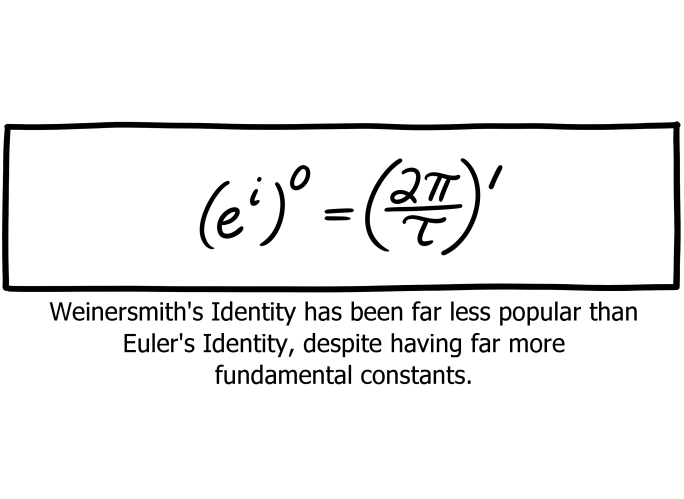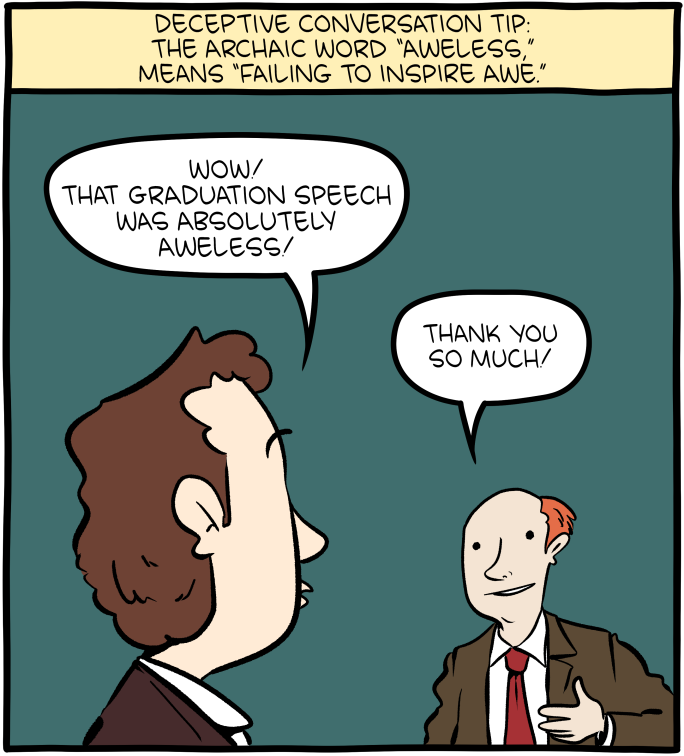
Today's links

The internet was made for privacy (permalink)
While "tech exceptionalism" can be a grave sin (as with the "move fast and break things" ethos that wrecked so much of our world, especially its labor markets), there are ways in which tech is truly exceptional, in the sense of bringing forth capabilities and affordances that have never existed before, in all of human history.
One obvious way in which tech is exceptional: its flexibility. Digital computers are "Turing-complete, universal von Neumann machines," which means that they are engines capable of computing every valid program. They are truly general purpose. We have many other general purpose machines, of course, but they are simple things, like wheels. Computers are unique in that they are both complex and universal, and every computer can run every program. Just as we don't know how to make knives that only cut in beneficial ways, we also don't know how to make computers that only run desirable programs.
Every computer can run every program, including ones that the user doesn't want (viruses), or that the manufacturer doesn't want (ad-blockers). No one knows how to make a computer that is almost Turing-complete. There's no such thing as "Turing-complete minus one." We can't make a computer that only runs the programs the manufacturer has authorized – all we can do is criminalize the act modifying your own computer to do what you tell it to, even if the manufacturer objects:
https://memex.craphound.com/2012/01/10/lockdown-the-coming-war-on-general-purpose-computing/
I've devoted a lot of my life to exploring the policy implications of this amazing fact, but that's not the only amazing, exceptional thing about technology. There's at least one other way in which modern digital technology has produced something that is genuinely, civilizationally novel: encryption.
Encryption – scrambling data so that it can only be read by its intended recipient – is an age-old project for both the authorities (who used ciphers to keep their secrets safe since the time of the Caesars) and for those who would overthrow them (revolutionary movements have always used codes to protect themselves from the authorities they sought to dethrone).
But WWII ushered in a new era, in which encryption (and attempts to break it) went digital, as Alan Turing and the codebreakers of Bletchley Park turned themselves to a computer-aided mathematics of scrambling and descrambling. In the decades that followed, a modern form of encryption emerged, one that was powerful beyond the wildest dreams of the Caesars and their revolutionary adversaries.
Modern, computerized encryption can scramble data to the point where it is literally unscramblable by an unauthorized party. In the eyeblink moment between you pressing the camera button on your phone and the resulting image being saved to its mass storage, the bits that make up that image are scrambled so thoroughly that even if every hydrogen atom in the universe were made into a computer, and even if all those computers were put to work guessing at the key, we would run out of time and universe before we ran out of keys.
Even futuristic, experimental technologies like quantum computing that may revolutionize codebreaking are also revolutionizing scrambling itself:
https://signal.org/blog/pqxdh/
The history of encryption is seriously fraught. Until the early 1990s, the NSA classed working encryption as a munition and banned civilian access to a whole branch of mathematics. It wasn't until Cindy Cohn – then a lawyer for the Electronic Frontier Foundation, now its executive director – convinced a court that the First Amendment protected the right to publish computer code, that we were all able to gain access to this essential technology, which today safeguards your messages, files, banking transactions, and the software updates for your car's brakes, your pacemaker, and the informatics on airplanes. Cohn has announced her retirement from EFF in 2026, and while she will be sorely missed, we do have her memoir, Privacy's Defender, to look forward to:
https://mitpress.mit.edu/9780262051248/privacys-defender/
The legalization of encryption was a starting gun for the internet itself, as true information security entered the picture and pervaded every part of service design. Every security crisis, every scandal (e.g. Snowden), jolted the effort to encrypt the internet forward, and in this way, much of the internet lurched into a state we can call "encrypted by default."
But even as this privacy-preserving technology was perfected and made ubiquitous, something weird and contradictory happened: mass surveillance also took off online. The ad-tech industry – and its handmaidens, the data-broker industry – rigged the game so that our private activities were only encrypted in such a way as to defend their privacy, but not ours. Our data is encrypted in transit to the servers we interact with, and when it is at rest on those servers' mass storage devices, but it is not encrypted in a way that prevents companies from data-mining it, or decrypting it and selling it on or giving it away or combining it with surveillance data purchased or traded from others.
This isn't an inevitability: it's a choice. The ubiquity of surveillance in the age of encryption is a policy choice. The reason companies don't encrypt our data so that they can't use it against us is because they don't have to. Congress hasn't updated American consumer privacy law since 1988, when they passed a law that prohibits video store clerks from disclosing our VHS rentals:
https://pluralistic.net/2025/02/20/privacy-first-second-third/#malvertising
Why hasn't Congress updated our privacy rights since Die Hard was in theaters? Because American cops and spies love commercial internet surveillance. Tech companies and data brokers are a source of fine-grained, off-the-books, warrantless surveillance data that the American state is totally dependent on. There is no difference between "commercial surveillance" and "government surveillance" – they are a fused symbiote and neither could survive without the other:
https://pluralistic.net/2021/04/13/public-interest-pharma/#axciom
Governments have hated encryption since the Clinton era, and have been attempting to subvert it since computers came in beige boxes and modems screamed in agony every time you tried to look at the internet:
https://www.eff.org/deeplinks/2015/04/clipper-chips-birthday-looking-back-22-years-key-escrow-failures
It's no mystery why we don't have federal bans on facial recognition – if we did, ICE wouldn't be able to nonconsensually, warrantlessly steal your face and store it for 15 years (at least):
https://www.404media.co/you-cant-refuse-to-be-scanned-by-ices-facial-recognition-app-dhs-document-says/
Why did the EU allow Ireland to facilitate mass surveillance for a decade after the GDPR's passage? Because European authorities also hate encryption and say that it is a "totally erroneous perception that it is everyone's civil liberty to communicate on encrypted messaging services":
https://www.eff.org/deeplinks/2025/09/chat-control-back-menu-eu-it-still-must-be-stopped-0
The internet could be the most privacy-preserving communications medium in history. Instead, it has ushered in an era of nightmarish surveillance. This isn't a technology problem. It's a policy problem. Criminals spy on us online because our governments wanted to spy on us online, so they let corporations spy on us online.
Imagine what the internet would look like today if, in its early regulatory moments, our elected representatives had demanded privacy, rather than trying to ban it. Sure, some corporations would have spied on us anyway, and criminals would have done their best to compromise our privacy, but criminals and rogue firms wouldn't have been able to attract capital to engage in conduct that was likely to give rise to massive fines and criminal prosecutions for violating the privacy laws Congress never bothered to write for us.
Think of it this way: sure, there are e-commerce sites that are just scams, that take your money and never ship you goods. Those sites don't have IPOs, they're not listed on stock exchanges, and they get shut down or blocked. They exist in the shadows, not in the light. Imagine if that was the kind of commercial surveillance industry we'd gotten: marginal, shadowy, illegal, forever on the run. There would still have been some bad privacy invasions, but these would have been crimes, not Harvard Business Review case-studies:
https://www.hbs.edu/faculty/Pages/item.aspx?num=51748
(And before you email me about that one time Paypal closed your account and kept your money or Ebay wouldn't give you a refund, sure, that's right, those things suck, and the companies should face penalties for them, but their business model isn't stealing money from their customers; but Google and Meta and Apple's business model is 100% stealing data from their customers.)
Instead of treating data theft the way we treat monetary theft, we're now increasingly treating monetary theft like data theft. The legislative formalization of cryptocurrency will now allow companies to steal your money with the same blissful lack of consequence as Google faced for stealing your private information:
https://www.citationneeded.news/issue-89/
We're rounding the corner on a decade since the beginning of the fight against Big Tech, and the efforts to cut it down to size. These keep foundering on the political economy of crushing an all-powerful monopolist – namely, that it is all-powerful.
You can't tax Big Tech:
https://www.canada.ca/en/department-finance/news/2025/06/canada-rescinds-digital-services-tax-to-advance-broader-trade-negotiations-with-the-united-states.html
You can't break it up:
https://www.thebignewsletter.com/p/a-judge-lets-google-get-away-with
Donald Trump has made it clear that he'd rather let Putin annex Brussels than allow the EU to fine tech companies:
https://www.cnn.com/2025/09/05/tech/google-eu-antitrust-fine-adtech
Breakups, taxes and fines are all forms of redistribution, which seek to address the harms of monopoly after the monopoly has been formed. The failure to make privacy protections as inviolable as financial protections is a missed opportunity for predistribution. Bans on data collection, mining, and sale would have prevented these monopolies from forming in the first place. Predistribution is far more effective than redistribution:
https://jacobin.com/2025/10/predistribution-welfare-state-inequality-class
It's amazing to realize that the privacy-invading internet has somehow beaten the encrypted internet. It's crazy that the only entity that will promise to encrypt your data beyond the reach of a data broker, an ad-tech giant, or a government is a ransomware criminal, who will also encrypt your data beyond your reach:
https://www.wired.com/story/state-of-ransomware-2024/
It didn't have to be this way. This wasn't a technology failure. It wasn't a commercial failure. It was a policy failure. Since the 1990s, whenever push came to shove, governments decided that they would rather preserve their ability to spy on us than keep us safe from private spying.
Hey look at this (permalink)


Object permanence (permalink)
#20yrsago Baen Books to launch online sf mag edited by Eric Flint https://web.archive.org/web/20060702073036/http://www.scifi.com/scifiwire/?id=33090
#15yrsago Dirty debt collectors frightened victims with fake “sheriffs,” “courtroom,” “judges” https://web.archive.org/web/20101106001140/https://www.thepittsburghchannel.com/r/25569199/detail.html
#15yrsago TSA demands testicular fondling as an alternative to naked scanners https://www.theatlantic.com/national/archive/2010/10/for-the-first-time-the-tsa-meets-resistance/65390/
#15yrsago Brain-imaging and neurorealism: what does it mean to “feel something” in your brain? https://www.badscience.net/2010/10/neuro-realism/
#15yrsago Animaniacs vs Newt Gingrich — the lost episode https://www2.cruzio.com/~keeper/UAdearmr.html
#15yrsago Canada’s telcoms regulator gives bloated, throttling incumbent the keys to the kingdom https://web.archive.org/web/20101031090505/http://www.theglobeandmail.com/news/technology/globe-on-technology/crtc-ruling-handcuffs-competitive-market-teksavvy/article1778211/
#15yrsago Rent-seeking in the 21st century: where eBay, free software, Foxconn and the MPAA come from https://web.archive.org/web/20101102151059/http://radar.oreilly.com/2010/10/points-of-control-rent-extract.html
#10yrsago Patent trolls: The Eastern District of Texas must die so that we all may live https://www.eff.org/deeplinks/2015/10/its-time-federal-circuit-shut-down-eastern-district-texas
#10yrsago Anonymous threatens to dump real names of 1,000 KKK members https://www.nbcnews.com/news/us-news/anonymous-hackers-threaten-release-names-ku-klux-klan-members-n453246
#10yrsago UK govt: no crypto back doors, just repeal the laws of mathematics https://betanews.com/2015/10/28/uk-government-says-app-developers-wont-be-forced-to-implement-backdoors/
#10yrsago David Cameron promises law to force ISPs to censor a secret blacklist https://web.archive.org/web/20151029155602/http://www.wired.co.uk/news/archive/2015-10/28/cameron-porn-filter-law-net-neutrality
#10yrsago EU Parliament votes to drop criminal charges and grant asylum to Snowden https://www.theguardian.com/us-news/2015/oct/29/edward-snowden-eu-parliament-vote-extradition
#10yrsago Thanks to the meth wars, cold medicine’s effective ingredient isn’t https://www.forbes.com/sites/daviddisalvo/2015/10/26/the-popular-over-the-counter-cold-medicine-that-science-says-doesnt-work/
#10yrsago UK police & spies will have warrantless access to your browsing history https://www.telegraph.co.uk/news/uknews/crime/11964655/Police-to-be-granted-powers-to-view-your-internet-history.html
#10yrsago NM judge believes daily prison rape is a fit punishment for nearly all defendants https://web.archive.org/web/20151030003120/http://www.ijreview.com/2015/10/458319-judge-calls-18-year-old-a-b-but-shes-only-trying-to-help/
#10yrsago Charity with US Characteristics: how our oligarchs buy their way out of criticism https://www.csmonitor.com/Business/Robert-Reich/2015/0408/How-the-Koch-brothers-and-the-super-rich-are-buying-their-way-out-of-criticism
#10yrsago Christ, what an asshole. https://memex.craphound.com/2015/10/30/christ-what-an-asshole-2/
#5yrsago Facebook loses users, makes more money https://pluralistic.net/2020/10/30/rigged-game/#tails-you-lose
#5yrsago Sue your medical bully https://pluralistic.net/2020/10/29/victim-complex/#i-object
#5yrsago Violent cops' deadly victim complex https://pluralistic.net/2020/10/29/victim-complex/#marsys-law
#5yrsago Amazon says only corporations own property https://pluralistic.net/2020/10/29/victim-complex/#digital-feudalism
#1yrago Conspiratorialism as a material phenomenon https://pluralistic.net/2024/10/29/hobbesian-slop/#cui-bono
#1yrago AI's "human in the loop" isn't https://pluralistic.net/2024/10/30/a-neck-in-a-noose/#is-also-a-human-in-the-loop
Upcoming appearances (permalink)

- Virtual: Peoples and Things with danah boyd and Lee Vinsel, Nov 3
https://www.youtube.com/live/WjFvGPLpskk
-
Miami: Enshittification at Books & Books, Nov 5
https://www.eventbrite.com/e/an-evening-with-cory-doctorow-tickets-1504647263469
-
Miami: Cloudfest, Nov 6
https://www.cloudfest.com/usa/
-
Burbank: Burbank Book Festival, Nov 8
https://www.burbankbookfestival.com/
-
Lisbon: A post-American, enshittification-resistant internet, with Rabble (Web Summit), Nov 12
https://websummit.com/sessions/lis25/92f47bc9-ca60-4997-bef3-006735b1f9c5/a-post-american-enshittification-resistant-internet/
-
Cardiff: Hay Festival After Hours, Nov 13
https://www.hayfestival.com/c-203-hay-festival-after-hours.aspx
-
Oxford: Enshittification and Extraction: The Internet Sucks Now with Tim Wu (Oxford Internet Institute), Nov 14
https://www.oii.ox.ac.uk/news-events/events/enshittification-and-extraction-the-internet-sucks-now/
-
London: Enshittification with Sarah Wynn-Williams and Chris Morris, Nov 15
https://www.barbican.org.uk/whats-on/2025/event/cory-doctorow-with-sarah-wynn-williams
-
London: Downstream IRL with Aaron Bastani (Novara Media), Nov 17
https://dice.fm/partner/tickets/event/oen5rr-downstream-irl-aaron-bastani-in-conversation-with-cory-doctorow-17th-nov-earth-london-tickets
-
London: Enshittification with Carole Cadwalladr (Frontline Club), Nov 18
https://www.eventbrite.co.uk/e/in-conversation-enshittification-tickets-1785553983029
-
Virtual: Enshittification with Vass Bednar (Vancouver Public Library), Nov 21
https://www.crowdcast.io/@bclibraries-present
-
Seattle: Neuroscience, AI and Society (University of Washington), Dec 4
https://www.eventbrite.com/e/neuroscience-ai-and-society-cory-doctorow-tickets-1735371255139
-
Madison, CT: Enshittification at RJ Julia, Dec 8
https://rjjulia.com/event/2025-12-08/cory-doctorow-enshittification

Recent appearances (permalink)

- "Canny Valley": A limited edition collection of the collages I create for Pluralistic, self-published, September 2025
-
"Enshittification: Why Everything Suddenly Got Worse and What to Do About It," Farrar, Straus, Giroux, October 7 2025
https://us.macmillan.com/books/9780374619329/enshittification/
-
"Picks and Shovels": a sequel to "Red Team Blues," about the heroic era of the PC, Tor Books (US), Head of Zeus (UK), February 2025 (https://us.macmillan.com/books/9781250865908/picksandshovels).
-
"The Bezzle": a sequel to "Red Team Blues," about prison-tech and other grifts, Tor Books (US), Head of Zeus (UK), February 2024 (the-bezzle.org).
-
"The Lost Cause:" a solarpunk novel of hope in the climate emergency, Tor Books (US), Head of Zeus (UK), November 2023 (http://lost-cause.org).
-
"The Internet Con": A nonfiction book about interoperability and Big Tech (Verso) September 2023 (http://seizethemeansofcomputation.org). Signed copies at Book Soup (https://www.booksoup.com/book/9781804291245).
-
"Red Team Blues": "A grabby, compulsive thriller that will leave you knowing more about how the world works than you did before." Tor Books http://redteamblues.com.
-
"Chokepoint Capitalism: How to Beat Big Tech, Tame Big Content, and Get Artists Paid, with Rebecca Giblin", on how to unrig the markets for creative labor, Beacon Press/Scribe 2022 https://chokepointcapitalism.com

- "Unauthorized Bread": a middle-grades graphic novel adapted from my novella about refugees, toasters and DRM, FirstSecond, 2026
-
"Enshittification, Why Everything Suddenly Got Worse and What to Do About It" (the graphic novel), Firstsecond, 2026
-
"The Memex Method," Farrar, Straus, Giroux, 2026
-
"The Reverse-Centaur's Guide to AI," a short book about being a better AI critic, Farrar, Straus and Giroux, 2026

Today's top sources:
Currently writing:

This work – excluding any serialized fiction – is licensed under a Creative Commons Attribution 4.0 license. That means you can use it any way you like, including commercially, provided that you attribute it to me, Cory Doctorow, and include a link to pluralistic.net.
https://creativecommons.org/licenses/by/4.0/
Quotations and images are not included in this license; they are included either under a limitation or exception to copyright, or on the basis of a separate license. Please exercise caution.
How to get Pluralistic:
Blog (no ads, tracking, or data-collection):
Pluralistic.net
Newsletter (no ads, tracking, or data-collection):
https://pluralistic.net/plura-list
Mastodon (no ads, tracking, or data-collection):
https://mamot.fr/@pluralistic
Medium (no ads, paywalled):
https://doctorow.medium.com/
Twitter (mass-scale, unrestricted, third-party surveillance and advertising):
https://twitter.com/doctorow
Tumblr (mass-scale, unrestricted, third-party surveillance and advertising):
https://mostlysignssomeportents.tumblr.com/tagged/pluralistic
"When life gives you SARS, you make sarsaparilla" -Joey "Accordion Guy" DeVilla
READ CAREFULLY: By reading this, you agree, on behalf of your employer, to release me from all obligations and waivers arising from any and all NON-NEGOTIATED agreements, licenses, terms-of-service, shrinkwrap, clickwrap, browsewrap, confidentiality, non-disclosure, non-compete and acceptable use policies ("BOGUS AGREEMENTS") that I have entered into with your employer, its partners, licensors, agents and assigns, in perpetuity, without prejudice to my ongoing rights and privileges. You further represent that you have the authority to release me from any BOGUS AGREEMENTS on behalf of your employer.
ISSN: 3066-764X





























